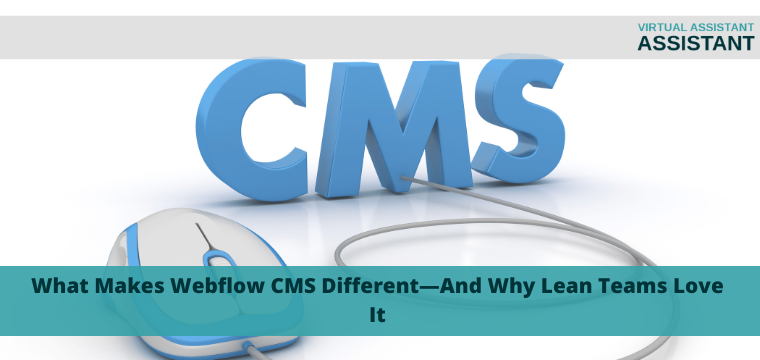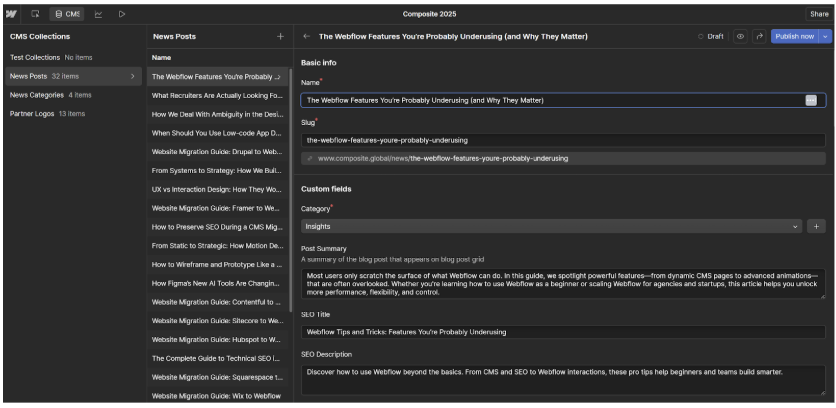 What Makes Webflow CMS Different—And Why Lean Teams Love It
What Makes Webflow CMS Different—And Why Lean Teams Love It
If you’ve ever tried to update a website and felt like you needed a developer just to move a headline, you’re not alone.
Many startups, solopreneurs, and lean marketing teams get stuck with bloated platforms or overcomplicated tools. That’s where Webflow CMS comes in—and why it’s become the go-to choice for teams that want flexibility without the technical overhead.
In this post, we’ll break down what makes Webflow CMS different from other platforms—and why it’s a perfect match for fast-moving teams, virtual assistants, and small businesses that need more control.

Table of Contents
It’s Visual—But Powerful
Unlike traditional CMS platforms like WordPress, where managing content often means jumping between backend fields and guessing what things will look like on the front-end, Webflow gives you a live visual editor.
You can:
- Edit text directly on the page
- Preview your content as it appears to visitors
- Make layout changes without code
- Publish instantly—no developer required
For VAs and marketers, that means fewer bottlenecks and no late-night Slack messages to a developer asking how to change a headline.
Components, Not Chaos
Most CMS platforms offer templated pages—or none at all. In Webflow, your development team (or partner agency) can build reusable components that let you create new pages from building blocks.
Instead of:
- Duplicating old pages and deleting content manually
- Repeating layout builds for every landing page
- Risking broken formatting with each edit
You get:
- Component-based layouts tailored to your business
- Visual consistency across every page
- The ability to scale faster without reinventing the wheel
At Composite Global, we help businesses design entire websites using this kind of structure. It’s how our clients launch faster—and avoid the mess of one-off pages that become impossible to manage over time.
 Built-In Performance Optimization
Built-In Performance Optimization
Most CMS platforms need plugins to perform well. Webflow comes with:
- Clean, semantic code
- Built-in lazy loading
- Responsive design defaults
- Hosting via fast global CDN
Translation: your site loads faster, ranks better, and requires fewer tech tweaks to stay in shape.
Performance isn’t just for big companies. If you’re running a service business, a slow site can kill conversions. Webflow gives you enterprise-level performance without the enterprise budget.
Clients Can Actually Use It
Here’s a major reason lean teams love Webflow CMS: non-technical people can actually use it.
Want to:
- Add a new blog post?
- Update a team member bio?
- Swap in new testimonials?
You can do all that in the Webflow CMS panel, without fear of breaking your layout—or breaking into a sweat.
If you’re a virtual assistant or support a small marketing team, this makes Webflow a powerful tool in your hands. It empowers you to keep content fresh without waiting on dev cycles.
It’s Designed for Modern Workflows
Remote teams. Freelancers. Agile sprints. Webflow fits into the way people actually work today. That’s a big part of why we use it to power everything from fintech companies to educational brands.
Unlike clunky legacy CMS platforms, Webflow lets teams:
- Collaborate on design and content simultaneously
- Ship pages without context switching
- Maintain brand consistency across fast-changing sites
It’s the CMS built for real work—not just web hobbyists.
Webflow CMS Is Built for Teams Who Don’t Have Time to Wait
Whether you’re part of a virtual assistant network or running a lean internal team, Webflow CMS helps you do more—faster.
And when you pair it with a strategic design system and clean site architecture, it becomes a long-term asset that grows with you.
Want to see what a scalable, editable Webflow site looks like?
Check out our services and see how we help teams like yours build smarter.
